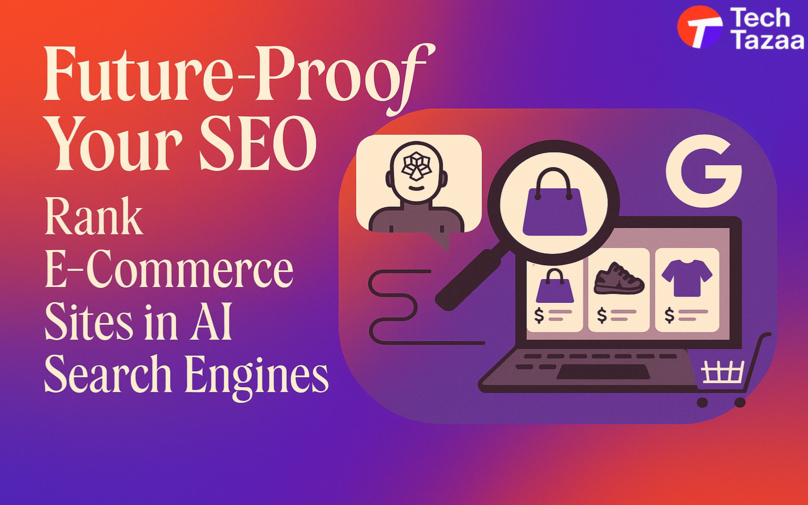AI-driven platforms like ChatGPT and Google’s Search Generative Experience (SGE) are changing how people search online; and your e-commerce brand needs to adapt. Conventional SEO is not enough anymore. To stay competitive, your store needs to be optimized for AI-enabled discovery. This means pretending queries are conversational, intent-laden, and extremely contextual.
In this guide, you will learn how to adjust your SEO strategy to rank in AI search engines, improve your visibility, and increase qualified traffic and conversions.
What Is AI Search — and Why It Matters for E-Commerce
AI search refers to search platforms powered by large language models (LLMs) like OpenAI’s ChatGPT, Google SGE, Bing Copilot, and Perplexity AI. Unlike traditional search engines that rely on keyword matching, AI search tools focus on understanding user intent, context, and natural language.
For e-commerce, this is transformative. Shoppers now ask highly specific questions like:
- “What’s the best DSLR camera under ₹50,000 for beginners?”
- “Which running shoes are good for humid weather?”
Instead of displaying a list of links, AI search often delivers summarized answers, product recommendations, or even direct shopping suggestions — reducing friction in the customer journey.
How AI Search Is Changing the SEO Game
AI-powered search engines prioritize user-focused, contextual content over traditional keyword-stuffed pages. Here’s what this means for your SEO strategy:
- Conversational Queries Dominate: Users search using full questions and natural language.
- Authority and Topical Relevance Matter More: AI engines prefer sources that provide comprehensive, trusted answers.
- Structured Data Is Critical: Product details, reviews, availability, and rich snippets help AI parse and promote your content.
- Featured Answers Reduce Clicks: If your site isn’t part of the AI-generated result, you risk losing visibility entirely.
How to Rank in ChatGPT Search Results
While ChatGPT isn’t a traditional search engine, it generates responses based on a vast amount of web content — including blog posts, forums, and reviews. Here’s how to increase your chances of being featured:
1. Create Blog Content That Answers Real Buyer Questions
Structure content around common customer queries like:
- “Is whey protein safe for daily use?”
- “Are bamboo sunglasses eco-friendly?”
Use a clear answer-first format, include product mentions, comparisons, and helpful internal links to drive engagement.
2. Earn Mentions on High-Authority Platforms
ChatGPT often cites:
- Forums like Reddit and Quora
- YouTube video descriptions
- Product roundups and listicles
- Influencer reviews and niche blogs
Pro tip: Build relationships with content creators who already rank well in these spaces.
3. Add Conversational FAQs to Product Pages
Include structured Q&A sections using conversational language.
💡 Instead of “Shipping Policy,” use:
Q: How long does delivery take in India?
A: Orders are shipped within 24 hours and delivered in 3–5 business days across India.
This helps AI better understand and surface your answers.
How to Optimize for Google’s AI-Powered Search (SGE)
Google’s Search Generative Experience (SGE) integrates AI into the search results page, often summarizing content directly on the SERP. Here’s how to ensure your products and content are included:
1. Implement Structured Data Markup
Use schema to provide clear, machine-readable information:
- Product schema (name, price, availability, rating)
- Review schema
- FAQ schema
Structured data increases the chances of appearing in featured snippets and AI answers.
2. Publish In-Depth, Helpful Content
Move beyond thin content. Create comprehensive, high-quality resources like:
- “How to Choose the Best Laptop for Video Editing in 2025”
- “Complete Guide to Organic Skincare Products for Oily Skin”
Include product suggestions, pros/cons, and internal links to relevant SKUs.
3. Use Clear Formatting and Visuals
AI systems extract data more easily when your content is well-structured. Use:
- Bullet points
- Subheadings
- High-quality images and comparison tables
- TL;DR summaries at the top of long posts
Keyword Strategy for AI search for Ecommerce
Keywords still matter — but it’s no longer just about exact matches. Now, your focus should be on search intent and question-based queries.
Tools to Use:
- AlsoAsked
- AnswerThePublic
- Google’s “People Also Ask”
- ChatGPT (to simulate conversational search queries)
Example Long-Tail Keywords:
- “Best smartwatch for runners in 2025”
- “Affordable shoes for flat feet in India”
- “Eco-friendly clothing brands with free shipping”
Naturally integrate these into your headings, meta tags, and content body.
Writing Content That Ranks in AI Search
AI-generated answers are based on relevance, clarity, and helpfulness. Here’s how to write content that fits:
- Start with the most direct answer to the user’s question
- Use natural language — write like you speak
- Present your product as a solution, not just a spec sheet
- Add internal links to guide readers to related content or product pages
- Use FAQs and conversational phrases to mirror real queries
Don’t Neglect Technical SEO
Even in the age of AI, technical SEO is foundational. Your site must be:
- Fast-loading (especially on mobile)
- Fully responsive across devices
- Crawlable with clean, structured URLs
- Optimized with alt text, meta tags, and product schema
Use tools like Google Search Console, Ahrefs, and PageSpeed Insights to audit and improve your technical SEO health.
Future-Proofing Tips: What to Test Next
Innovative e-commerce brands are already experimenting with:
- Shoppable Blog Posts: Allow users to purchase products directly from content.
- ChatGPT Plugins or GPTs: Provide guided product recommendations or live search.
- Email-to-SEO Strategy: Turn customer support questions into searchable blog content.
- AI-Written Product Descriptions: Blend fast AI generation with human editing for tone and accuracy.
Final Thoughts: The AI Search Revolution Is Here
AI search is no longer a concept — it’s the present. If your e-commerce SEO strategy isn’t built for tools like ChatGPT and Google SGE, you’re already falling behind.
Start now:
- Answer real customer questions
- Optimize your content for natural language
- Focus on topical authority and structured data
Ready to Rank Higher in AI-Powered Search?
Want to future-proof your e-commerce SEO and drive more qualified traffic? Book a Free SEO Audit Today and discover how we can help you rank on Google and ChatGPT.
Frequently Asked Questions (FAQs)
- What is AI search in e-commerce?
AI search in e-commerce refers to search engines powered by artificial intelligence and large language models (LLMs) like ChatGPT, Google SGE, and Bing Copilot. These platforms understand user intent and context, providing more accurate and conversational results — including product suggestions, summaries, and direct purchase links.
- Can I rank in ChatGPT search results?
Yes — while ChatGPT isn’t a search engine in the traditional sense, it pulls responses from content across the internet. To improve your chances of being included in its answers, publish helpful, conversational content, get mentioned on reputable sources, and ensure your brand is visible across the web.
- How is Google SGE different from regular search?
Google’s Search Generative Experience (SGE) takes traditional search results and shallows them using AI to aggregate answer information and provide insights and possibly a direct answer to user queries on the SERP. SGE presents immediate, relevant insights — with fewer clicks. To optimize for SGE means creating concise, structured, and long form content with end-user intent.
- What type of content helps you rank in AI search engines?
Content that performs well in AI search includes:
- Answer-focused blog posts
- Product comparison guides
- Long-form how-to articles
- Conversational FAQs
- Structured data-backed pages (using schema)
The key is to be genuinely helpful and answer questions users are likely to ask in natural language.
- Do I still need keywords if AI understands intent?
Sure, keywords are important. But instead of focusing on exact-match terms, prioritize long-tail, question-based, and semantic keywords, which work better for AI to interpret and surface.
- How can e-commerce stores prepare for future AI search updates?
To stay ahead:
- Invest in long-form, helpful content
- Keep technical SEO up to date
- Use schema markup
- Monitor changes in Google SGE and OpenAI’s integrations
- Turn customer questions into searchable content


